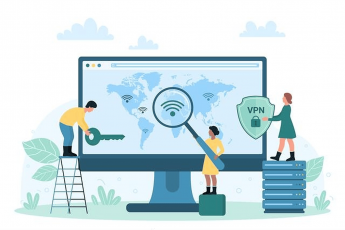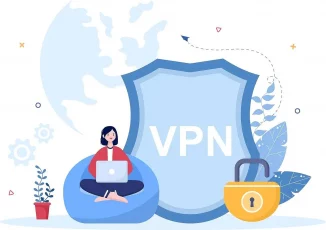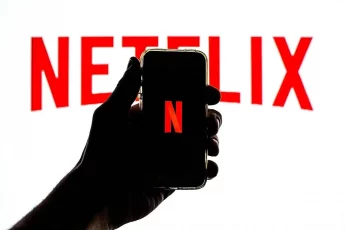Virtual Private Network, or what you know as a VPN, is a wonderful resource for switching online locations. These services not only change your IP address but also ensure data security. Thus, you will likely remain protected from common cyber attacks. But the problem with using a VPN is how to choose one?
Today, many VPNs are available in the market, offering different features and bearing different price tags. Of course, some providers offer free services too. But they are not as vigilant as the most paid ones regarding performance and security.
This abundance of VPN services has made it difficult for an average user to pick the right option.
So, here we present a detailed VPN selection guide for you. We will explain how to choose the right VPN and review the purposes a VPN would serve you.
How VPNs differ from each other
The primary technology behind all the VPN services predominantly remains the same. All of them comprise a widespread network of servers, offer virtual IP addresses and locations, and employ data encryption.
Then what makes so many VPNs thrive today if they are similar, we hear you ask.
Well, many other factors significantly distinguish VPNs from each other. These factors do not directly affect the VPN’s functionality, but they do impact the service’s overall performance. Hence, knowing these parameters is essential for you to know before learning how to choose the best VPN.
Duration of free/paid trials
Most VPNs today offer free or paid trials to the users. But what matters here is the duration for which the service allows the users to assess a VPN’s usefulness. This trial period may range from 3 or 7 days to 30 days, depending on the provider. Some providers, however, even generously offer a 45-days trial.
Device compatibility and apps
Most VPN users of today own multiple devices. So, they need to protect them all from online privacy breaches, for which they need a VPN. Hence, many service providers offer support for multiple platforms.
However, some VPNs lead the niche by offering diversified compatibility with dedicated apps. Others prefer to stay modest here and instead provide a VPN router client to facilitate customers.
Simultaneous connections
The number of simultaneous device connections a VPN can support varies with different providers.
It mainly depends on the provider’s technical and financial capabilities. Since handling multiple connections from a single account eventually put more load on the network, you won’t find huge support from small VPN providers.
Nonetheless, some providers, like Surfshark, break convention by offering unlimited simultaneous connections right from the beginning.
Unique IPs
Every VPN server gives the user a separate IP address to use. So, the VPN providers with a huge customer base tend to offer more unique IPs to prevent reuse. It is particularly beneficial for the end-users since you won’t have to worry about an IP blacklist due to other users’ abusive activities. Small VPN providers, however, provide fewer unique IPs (usually).
Unique servers and locations
The number of unique servers and locations is a major factor contributing to the credibility of a VPN provider. The higher these numbers are, the more choices you get to choose an online location without fearing server congestion.
But of course, you don’t have to pay for all these numbers if you don’t need many locations. Hence, some service providers offer fewer server locations that suffice for their customers. They don’t need to go overboard unless they plan an expansion.
Why do people use a VPN?
While every privacy enthusiast today recommends using a VPN, you might wonder why regular internet users need it. So, here’s a quick review of how this fantastic security tool benefits users like you.
At first, the VPNs allow changing the IP address location by rerouting your data via your chosen VPN server. So, VPNs typically facilitate people who work remotely, specifically in the corporate sector.
For instance, many companies limit access to their sensitive systems for anyone outside the company network. In such cases, VPN services help the employees access those systems even from outside the office.
This helpful feature significantly contributed to keeping the economy running during the COVID-19 pandemic. Precisely, because of VPNs, people could continue working.
Secondly, the option to safely change online locations facilitates the journalists and students to bypass geo-restrictions. They can access blocked or restricted material to gain information.
Whereas gamers and general users also use VPNs for similar reasons – bypassing content restrictions, such as Netflix.
Besides, the encryption technology offered by VPN providers attracts privacy-savvy users. So they remain protected from prying eyes, snoopers, ISP throttling, government spying, etc.
Also, the same security feature of VPNs protects users from cyberattacks when connected to public WiFi. So whether you are at the airport, in a coffee shop, or want to connect to free WiFi on the go, you can easily do so while using a VPN.
In brief, a robust VPN service plays a role whenever a user wants to mask the real IP address.
Evaluate your need(s) to use a VPN

As explained above, people use VPNs for plenty of reasons. This diversified use is one of the key advantages of VPNs that have added to the service’s popularity.
Therefore, no one can specifically recommend a virtual private network to all users. Since people have different requirements, it is likely that a VPN would work perfectly well for one person but would fail to satisfy another.
Perhaps, that is why we have so many VPN service providers available today.
So, before you start wondering how to choose the right VPN, you should first assess your needs. Then, when you are clear about why exactly you need a VPN, you can decide better.
Here we list a few main questions to ask yourself to evaluate your need for a VPN.
1. Are you a frequent traveler?
Frequent travelers, tourists, and expatriates often face connectivity issues.
Naturally, when they can’t arrange an internet connection on their own, they would have to depend on the service available in that region.
They are the ones who use free WiFis the most during their stay at hotels.
During this use, they have to agree to all the terms and conditions of the internet service provider in that area. If the country has strict data retention policies, the foreigners would eventually lose their privacy.
Nonetheless, VPNs help them in securing their internet connection.
So, if you’re a traveler or are planning a visit to another country, you need a VPN.
Nonetheless, before your visit, make sure that VPNs are legal in your destination state. Otherwise, for places like UAE, where VPNs are highly restricted, find a workaround or professional help to access this facility.
2. Do you need a VPN to protect your home network?

While VPNs work well in protecting your identity online, they may not be as effective for securing your home network at the app level.
When you connect to a remote VPN server, you actually connect to a remote network and not to your own. Thus, you get protection from online threats only. In contrast, your network remains vulnerable to local attacks.
So, if this is your sole purpose of getting a VPN, better drop the idea. Or make sure that the one you buy effectively meets your needs.
A VPN can protect your home network only when applied at the router level. So, either opt for a VPN provider that offers such service or purchase a router with a built-in VPN server.
3. Do you need a VPN service for safe browsing?
Using a VPN is a general safe browsing practice as well. From connecting to public WiFis to using the internet at home, with a VPN, you remain secure.
In fact, you are immensely protected with a VPN from most cyber-attacks, even when connected to a compromised network. It’s because the data you generate is encrypted.
Although, some public connections also claim to offer security as they prevent unauthenticated device connections. Nonetheless, these networks are still not secure since the password is known to many.
Also, you can never trust the router’s security, even if the WiFi on its own is unharmed. If the router firmware isn’t updated, is vulnerable, or hacked, all users connected to it, including you, will be at risk.
However, you can prevent any problems to a greater extent with a VPN. Although a VPN router is a great option to address this issue, you can certainly not apply it to a public network. Thus, you can install a VPN on your device(s) that you connect to public WiFi networks.
For this, you don’t have to go for a costly VPN service. Instead, any modest VPN provider with optimum speeds and secure operations will suffice.
4. Are you looking for a VPN to access blocked content?
Whether you’re traveling abroad and want to access local content or wish to unblock content from another country at your own place, hiding your IP address doesn’t always work. It’s because the websites or content providers use other strategies to detect false IP addresses.
However, if you use VPN services, you will likely succeed in bypassing content restrictions.
That is not only true for accessing content not available in your area from the vendors’ end. But also applies to evade censorship implemented by the authorities in your area.
For example, if you want to unblock Netflix USA while in India, you can use a VPN to connect to a US server. Likewise, you can access BBC iPlayer in the United States with a UK VPN server.
Content restrictions aren’t always at the country level. Rather employers and educational institutions also block many websites on their networks. That is done seemingly in an attempt to remove distractions. But it isn’t so useful since it also creates hurdles in accessing information.
So, keep your device loaded with a robust VPN if you need to access blocked content, such as social media platforms, in your school or office.
5. Do you live in a restricted-internet country?

Countries like China, Iran, Russia, and UAE have strict internet regulations that curb internet freedom.
Thus, accessing the desired information online is troublesome for the people living, arriving, or temporarily staying in these countries.
Do you think a VPN would help in this case?
Technically, yes. Practically, …? Well, it depends on your choice.
Since these countries expect people to use VPNs to bypass censorships, they have restricted or legally banned VPNs.
So, either you cannot download a VPN at all, or, if you could, you are likely to get caught. The authorities here implement deep packet inspection and similar techniques to detect VPN services.
Hence, you should avoid using this tool unless you understand how to pick the right VPN to use in such regions.
While almost all VPNs work pretty well to evade censorship, most VPNs do not work for countries with internet restrictions in place as they can appear on the radar of surveillance authorities such as the NSA’s PRISM Program.
Therefore, you should choose a VPN provider that seamlessly operates in these locations.
Also, the VPN should offer Kill Switch to prevent any accidental exposure of your internet data packets online following a server disconnection.
6. Are you over-protective of your data?
Just like censoring VPNs, some countries implement strict laws for data retention.
While these regions may not apply harsh internet censorship and allow VPN providers to serve the customers, the authorities bound the VPN companies to log users’ data.
Although, these nations advocate for data logging since cybercriminals usually exploit VPN services to stay under the radar. Hence, when VPN companies log users’ activities, such as IP addresses, browsing data, and more, the authorities can trace the criminals by asking them to hand over suspects’ data.
Nonetheless, it is still problematic because of the eventual breach of users’ privacy.
Of course, when VPNs log every detail of the user, the purpose of anonymity and security fails right there.
So, if you want to use a VPN because you don’t want your data to be logged, choose a VPN that comes with a proven no-logs policy.
7. Do you want to go anonymous online?
The more avid privacy advocates, cybersecurity experts, and investigative journalists often need to stay anonymous online. Because of their sensitive nature of work, such people cannot even afford an accidental exposure of their IP addresses for milliseconds.
If you’re one of them, you can surely use a VPN to mask your online existence. But it won’t suffice the purpose.
Like any other program, VPNs are prone to technical glitches, the most common being a VPN connection drop. That’s why most vigilant VPN companies apply the Kill Switch feature to avoid this glitch.
However, you still can’t be sure of VPNs’ reliability. So, you need to use Tor along with a VPN connection. It is just an additional step required to protect your privacy.
How to choose a VPN that’s right for you? Here’s what to look for!

After going through the above section, you must have found why we emphasized evaluating your requirement before selecting a VPN.
As you now know, not every VPN service would meet your desired purpose of using it. Hence, you should jot down why, when, and how often you need a VPN before investing in any service.
However, your efforts don’t just end here!
Instead, you also need to research the VPN companies, assess their performance and features, and check their policies. If you find them in line with what you want and expect from your virtual private network, go for it. If not, look for some other service.
But how to select a perfect VPN? We hear you ask.
Don’t worry and read along, as below is a guide on picking the right VPN.
1. Encryption protocols
Different VPNs apply different encryption protocols. Most VPN companies also offer more than one protocols, which you can use one at a time.
These differences in encryption protocols explain that you shouldn’t trust a service if it uses the word ‘encryption.’ Not every encryption is indecipherable. Some protocols are extremely weak to protect anyone.
Since encryption and security are the prime reasons for using a VPN, you should only choose VPN after going through its encryption protocols.
Commonly offered encryption protocols include OpenVPN, L2TP/IPsec, and PPTP.
Among these, OpenVPN is the most secure encryption protocol.
It is an open-source protocol that remains under the review of cybersecurity experts. Hence, any potential vulnerabilities will likely receive quick fixes. Most good VPN companies support this protocol. However, it might affect the browsing speed.
PPTP is way faster than OpenVPN. Nonetheless, it is also vulnerable to attacks as it is the weakest.
The other one, L2TP/IPsec, is an intermediate of the above two protocols and is currently a built-in feature in most mobile devices.
So, you can choose a VPN with PPTP if you merely want mild ciphering of data with fast speed. However, if security is your priority, then stick to the OpenVPN protocol.
2. No data-logging policy
When you connect to the internet, you expose your device with accurate details to ISP tracking and other online trackers. But, with a VPN, you authorize the service to take control of your device and reroute all the traffic to and from your device through its servers.
In this way, VPNs mask your identity by serving as the middleman between you and the internet. Unfortunately, this is where the problem exists.
Indeed, a good VPN serves as your armor to the online world.
Conversely, it becomes the sole entity that knows everything about you.
In simple words, VPN knows your IP address, device details, browsing history, and more information. Thus, it can log this data, either wholly or partly, and use it in any way.
For instance, many free VPNs sell your data to advertisers and third parties. That is how they make money.
The paid one may or may not monetize your data. Nonetheless, they can still record your data and share it with the government and other relevant authorities when needed.
So, what’s the purpose of using a VPN in the first place if you are eventually exposed?
Some top paid VPN companies respect your privacy to the extent that they employ a strict no-logs policy. It means they will never record even the non-identifying details. Even if they do, they record it for a few hours at maximum, that too, for service maintenance and improvements.
Therefore, before investing in any VPN, go through the company’s data-logging policies and verify that the service implements strict no-logging. Only then can you trust the service.
3. Jurisdiction

Today, the prying eyes of some regions strive to track almost every individual’s online activities. Known as Five, Nine, and Fourteen Eyes, these groups of countries extensively spy on their citizens. Plus, they also share this information with each other when required.
Due to their surveillance, these countries implement harsh data retention policies for service providers, including VPN companies.
Although they would never publicly admit such measures, you can’t be sure about the no-log policy of VPNs based in these countries.
Nonetheless, if the VPN service providers explicitly state no-logging despite their base region’s policies, then you may perhaps go for them.
However, we recommend you opt for VPN providers headquartered in neutral zones with minimal legal obligations.
4. Global coverage
Another important thing you should consider before choosing a VPN is the number of servers. The larger a VPN’s coverage is, the better will be its performance.
The ‘number of servers’ doesn’t mean that your VPN should necessarily offer more countries. Again, though, it’s a plus. But it’ll eventually be of no use if the VPN provider hosts very few servers in each country.
Rather a VPN with more servers in the same country offers more stable connections, avoids server congestion following huge traffic, and ensures fast speeds.
Also, such a VPN works better with services like Crackle US and Netflix that frequently block VPNs. You can quickly switch your server without changing the country the moment you detect a ban.
Besides, look for the number of servers available in your desired country. For example, a VPN with thousands of servers in Asia won’t benefit you if you want a VPN to unblock a USA site.
Hence, before choosing a VPN, analyze your VPN server requirements and see if the VPN provider meets your needs.
5. DNS and IPv6 Leaks

A common problem that the users face while using a VPN is failing to unblock sites’ restricted content. Some websites figure out that you’re faking your IP address; hence they still block you.
But how is it possible?
VPNs are vulnerable to two main leaks – DNS leaks and IPv6 leaks.
Through these two sources, a VPN leaks some differences between your visible online location and your computer behavior.
These differences allow the target websites and web trackers to understand that you have employed some method to mask your online location.
In brief, a DNS leak happens when your device’s request still routes through your ISP’s DNS servers. Hence, there would be a visible conflict between the DNS server and the VPN server. In contrast, an IPv6 leak happens when the VPN masks your IPv4 IP address but fails to handle IPv6. Hence, some websites can track the conflict between IPv4 and IPv6 to detect a VPN.
(To know details about how these leaks happen, check out our detailed guide on IP leak protection.)
To avoid these leaks, some VPN providers apply various techniques. For instance, they would block IPv6 or would mask IPv6, too, alongside the IPv4. Likewise, they would use their own DNS servers instead of relying on a third-party DNS to avoid DNS leaks.
So, whether your purpose is to bypass content censorship or remain anonymous online, ensure that your VPN prevents such IP leaks.
6. VPN features
Before subscription, check the availability of the following features with the VPN services. You should likely prefer the one that bears the maximum or all of them.
- User interface: Regardless of how robust a VPN is, it won’t help if you can’t understand using the app. Therefore, choose a service that offers simple and user-friendly apps that you can easily set up on your devices. Again, it is essential if you haven’t used a VPN before.
- Kill Switch: This feature disconnects your internet connection following connection dropouts, protecting your privacy. Consider it a must-have when choosing a VPN.
- Split tunneling: Though it isn’t a necessity, it is an ideal option to carry on with your local browsing activities, even with a VPN.
- Bandwidth and throttling: If you wish to use your VPN for streaming, make sure that it doesn’t cap your bandwidth. Please go through the VPN’s terms and conditions, read fine prints, and Google a bit to know them.
- The number of simultaneous device connections: The higher the number, the better. Yet, if you’re opting for a premium VPN, make sure that it at least supports five simultaneous connections on one account.
- Compatibility with multiple platforms: Your VPN shouldn’t limit support for mobile phones and PCs only. Instead, it should also support smart appliances, routers, and other devices. An ideal VPN should offer support Windows, Mac, iOS, Android, Linux, and routers.
7. Subscription costs and packages
Although using free VPNs is lucrative, they are likely to breach your privacy by monetizing your data. So, go for the paid ones that offer affordable packages.
Also, look for subscription options and choose the plan that best meets your needs. For instance, most VPNs offer monthly, bi-yearly, and yearly plans. Going with the more extended plan is ideal if you plan to use the VPN for a long time since it’s usually cost-effective.
8. Payment methods
Choose a VPN with more payment methods so that if you face problems while paying with one option, you can choose the other. Also, look for the availability of payments via cryptocurrency if you wish to make anonymous payments.
9. Free trial or money-back guarantee
While paid VPNs usually offer better services than free VPNs, you can’t trust every paid VPN for the services. And, of course, risking your money without knowing the service isn’t wise.
Therefore, look for any free or paid trial offers from the VPN provider. In the latter case, ensure that the service has a genuine money-back guarantee to keep your money safe. (You can find some of the ideal VPNs with lucrative trial offers here.)
10. Customer support
Regardless of whether you’re an avid VPN user or will be choosing one the first time, you may get stuck at any point where you would need help. Hence, you must look for a VPN service that offers vigilant customer support to attend to your queries.
While you may usually find email support with most providers, 24/7 support with live chat is ideal. Otherwise, make sure that the response time isn’t long.
11. Customer reviews
A higher number of positive customer reviews gives an idea about the overall impressive services of a VPN provider. Yet don’t fall for the fake reviews; look for the ones indicating verified purchases to learn about the service.
Can I choose the right VPN by going through the VPN reviews?

If you search online for the best virtual private network services, you will come across numerous VPN reviews. Often, these reviews contain a lot of praise for specific services. But does it mean that those VPNs are always outstanding?
Maybe, no! Instead, what it hints at is that the reviews are paid promotions.
Many blogs and review websites serve as VPN affiliates. They make money by redirecting leads to the VPN providers through their content.
Since it’s about business, they will persuade you to opt for those services. Sometimes, they might even lie to you in their reviews. They would hardly touch the problems with the VPN and would highlight the pros to the extent of making them appear flawless.
Such reviews are a problem because you can’t trust their recommended services.
Although, there are some ethical VPN affiliates that, despite earning commission for redirecting leads, never go for biased promotions.
Such reviews would not typically advocate for an ABC VPN; instead, they would also highlight the problems with the service. Hence, you get a better idea about the VPN providers’ performance.
To identify the genuineness of a VPN provider, check out their affiliate program. Also, go through their policies for marketers and resellers, and choose the one that condemns boastful promotions.
I’m confused. Can you help me choose a VPN?
After reaching this point, you would have a pretty good idea about which VPN to choose.

However, you might feel overwhelmed after learning how to choose a VPN through this guide. If you haven’t used a VPN before, you would be confused about where to begin.
So, here we advise the three best VPNs for you.
- NordVPN: Super-fast VPN service based in Panama. The provider offers six simultaneous connections on a single account and supports all major platforms, including routers. The subscription plans are also affordable, whereas NordVPN protects your payments with a 30-day money-back guarantee.
- Surfshark VPN: The best VPN with the cheapest subscription plans. Surfshark offers unlimited simultaneous connections and is compatible with all major platforms. This provider is based in the Netherlands. And, like ExpressVPN, it provides a risk-free paid trial with a 30-day money-back guarantee.
- ExpressVPN: Offers military-grade encryption, based in the privacy-friendly jurisdiction of the British Virgin Islands, supports all major platforms, and offers five simultaneous connections. While the subscription costs are relatively higher, ExpressVPN offers a risk-free 30-day money-back guarantee. (Though, if you are interested in using this service for free, check out this detailed guide to getting ExpressVPN free trial.)
(Though this site runs an affiliate program to keep serving you/our readers for free, we never go for paid reviews. So, monetary gains do not influence our VPN recommendations here.)
These three VPNs are our choice because not only do they offer superb performances, but they also take care of your privacy.
Wrapping up
After going through this detailed guide, you can now choose the right VPN for your needs.
As you can see, selecting the best VPN from many substandard services isn’t trivial. Instead, it requires your time and effort to assess your preferences and research suitable VPNs.
Nonetheless, once you spend some time on it, you will cherish your decision.
FAQs
Evaluate your needs first. You can decide which VPN meets your requirements when you know why you need a VPN.
Ease of use is something that only you can decide better for yourself. Nonetheless, the VPNs recommended above are easy to use for most users.
If you do not want your online security and privacy compromised, you undoubtedly need a VPN. Unless VPNs are illegal in your country, you should use one regardless of whether you think you need it or not.






